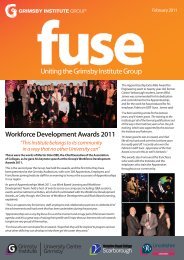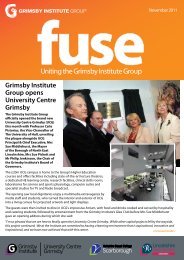Journal of Research & Scholarly Output 2006 - Grimsby Institute of ...
Journal of Research & Scholarly Output 2006 - Grimsby Institute of ...
Journal of Research & Scholarly Output 2006 - Grimsby Institute of ...
Create successful ePaper yourself
Turn your PDF publications into a flip-book with our unique Google optimized e-Paper software.
Except in relation to the franchising <strong>of</strong><br />
undergraduate courses to further education<br />
establishments, the college contribution to<br />
the great expansion <strong>of</strong> higher education in<br />
England was secondary. Its role was<br />
auxiliary and ancillary. Neither their history<br />
<strong>of</strong> engagement with higher level work, nor<br />
their costs, nor their flexibility and<br />
accessibility, were able to compete with a<br />
pattern <strong>of</strong> demand that reproduced and<br />
reinforced the hegemony <strong>of</strong> the honours<br />
degree in the English system. In this country,<br />
most <strong>of</strong> the surge in growth was focused on<br />
the first degree and was taken by the higher<br />
education institutions.<br />
Among the latter, it was the polytechnic<br />
numbers that expanded the fastest (by more<br />
than two-thirds during the expansion years).<br />
The rate <strong>of</strong> increase among the established<br />
universities was half this figure (at 37%) and<br />
among the further education colleges –<br />
where growth was slowest – it was 23%. In<br />
any other context, the level <strong>of</strong> growth in<br />
further education would have been<br />
exceptional but the effect <strong>of</strong> spectacular<br />
expansion elsewhere was to reduce the<br />
college proportion <strong>of</strong> higher education<br />
enrolments.<br />
It was only the introduction <strong>of</strong> franchising,<br />
always a minor phenomenon in Scotland,<br />
that prevented an overall reduction in the<br />
college contribution to English higher<br />
education. Franchising involved a higher<br />
education establishment sub-contracting<br />
the teaching <strong>of</strong> some <strong>of</strong> its undergraduate<br />
programmes (in whole or part) to one or<br />
more further education colleges. The fastest<br />
expanding polytechnics were in the van <strong>of</strong><br />
this development, especially when capacity<br />
limits had been reached in taking additional<br />
students into their own buildings and<br />
campuses.<br />
Colleges were also keen to enter into<br />
franchise arrangements. It brought new<br />
income streams into the college and the<br />
status attached to higher level work was<br />
attractive to many teaching staff. It provided<br />
avenues <strong>of</strong> progression for its students,<br />
especially those unable or unwilling to<br />
attend a higher education institution outside<br />
their locality or region. Franchising also<br />
brought some colleges into higher<br />
education for the first time as well as<br />
diversifying the levels and subjects <strong>of</strong><br />
undergraduate study taught in further<br />
education settings.<br />
Like the growth to which it gave rise,<br />
franchising was neither planned nor<br />
regulated by the sector bodies and it<br />
attracted concern in some quarters that<br />
quality and standards were being<br />
compromised. It coincided as well with the<br />
creation in 1992 <strong>of</strong> a new further education<br />
sector. Part <strong>of</strong> the rationale for this reform in<br />
England was to relieve further education<br />
colleges <strong>of</strong> the burden <strong>of</strong> higher education<br />
(seen as the proper responsibility <strong>of</strong><br />
universities and polytechnics) and so enable<br />
them to focus more clearly on their core<br />
mission (at the upper secondary and<br />
associated tertiary levels). Indeed, the new<br />
further education funding council operated a<br />
policy <strong>of</strong> ‘no policy’ in respect <strong>of</strong> the higher<br />
education it inherited from the previous local<br />
authority system and which it was obliged to<br />
continue to fund.<br />
Page 12<br />
FOCUS

















